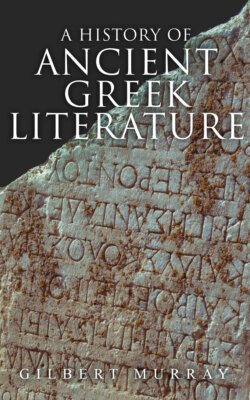Читать книгу A History of Ancient Greek Literature - Gilbert Murray - Страница 7
На сайте Литреса книга снята с продажи.
THE HOMERIC POEMS
ОглавлениеIf we try to find what poems were definitely regarded as the work of Homer at the beginning of our tradition, the answer must be -- all that were 'Homeric' or 'heroic'; in other words, all that express in epos the two main groups of legend, centred round Troy and Thebes respectively. The earliest mention of Homer is by the poet Callinus (ca. 660 B.C.), who refers to the Thebais* as his work; the next is probably by Semonides of Amorgos (same date), who cites as the words of 'a man of Chios' a proverbial phrase which occurs in our Iliad, "As the passing of leaves is, so is the passing of men." It is possible that he referred to some particular Chian, and that the verse in our Iliad is merely a floating proverb assimilated by the epos; but the probability is that he is quoting our passage. Simonides of Keos ( 556-468 B.C.), a good century later, speaks of " Homer and Stesichorus telling how Meleagros conquered all youths in spear-throwing across the wild Anauros." This is not in our Iliad or Odyssey, and we cannot trace the poem in which it comes. Pindar, a little later, mentions Homer several times. He blames him for exalting Odysseus -- a reference to the Odyssey -but pardons him because he has told "straightly by rod and plummet the whole prowess of Aias"; especially, it would seem, his rescue of the body of Achilles, which was described in two lost epics, the Little Iliad* and the Æthiopis.* He bids us "remember Homer's word: A good messenger brings honour to any dealing" -- a word, as it chances, which our Horner never speaks; and he mentions the "Homêridæ, singers of stitched lays."
If Æschylus ever called his plays3 "slices from the great banquets of Homer," the banquets he referred to must have been far richer than those to which we have admission. In all his ninety plays it is hard to find more than seven which take their subjects from our Homer, including the Agamemnon and Choëphoroi,4 and it would need some spleen to make a critic describe these two as 'slices' from the Odyssey. What Æschylus meant by ' Homer'was the heroic saga as a whole. It is the same with Sophocles, who is called 'most Homeric,' and is said by Athenæus (p. 277 ) to "rejoice in the epic cycle and make whole dramas out of it." That is, he treated those epic myths which Athenaeus only knew in the prose 'cycles' or handbooks compiled by one Dionysius in the second century B.C., and by Apollodôrus in the first. To Xenophanes ( sixth century) ' Homer and Hesiod' mean all the epic tradition, sagas and theogonies alike, just as they do to Herodotus when he says (ii. 53), that they two "made the Greek religion, and distributed to the gods their titles and honours and crafts, and described what they were like." There Herodotus uses the conventional language; but he has already a standard of criticism which is inconsistent with it. For he conceives Homer definitely as the author of the Iliad and Odyssey. He doubts if the Lay of the Afterborn* be his, and is sure (ii. 117) that the Cypria* cannot be, because it contradicts the Iliad. This is the first trace of the tendency that ultimately prevailed. Thucydides explicitly recognises the Iliad, the Hymn to Apollo, and the Odyssey as Homer's. Aristotle gives him nothing but the Iliad, the Odyssey, and the humorous epic Margîtes.* Plato's quotations do not go beyond the Iliad and the Odyssey; and it is these two poems alone which were accepted as Homer's by the great Alexandrian scholar Aristarchus (ca. 160 B.C.), and which have remained ' Homeric' ever since.
How was it that these two were originally selected as being ' Homer' in some special degree? And how was it that, in spite of the essential dissimilarities between them, they continued to hold the field together as his authentic work when so many other epics had been gradually taken from him? It is the more surprising when we reflect that the differences and inconsistencies between them had already been pointed out in Alexandrian times by the 'Chorizontes' or 'Separators,' Xenon and Hellanicus.
